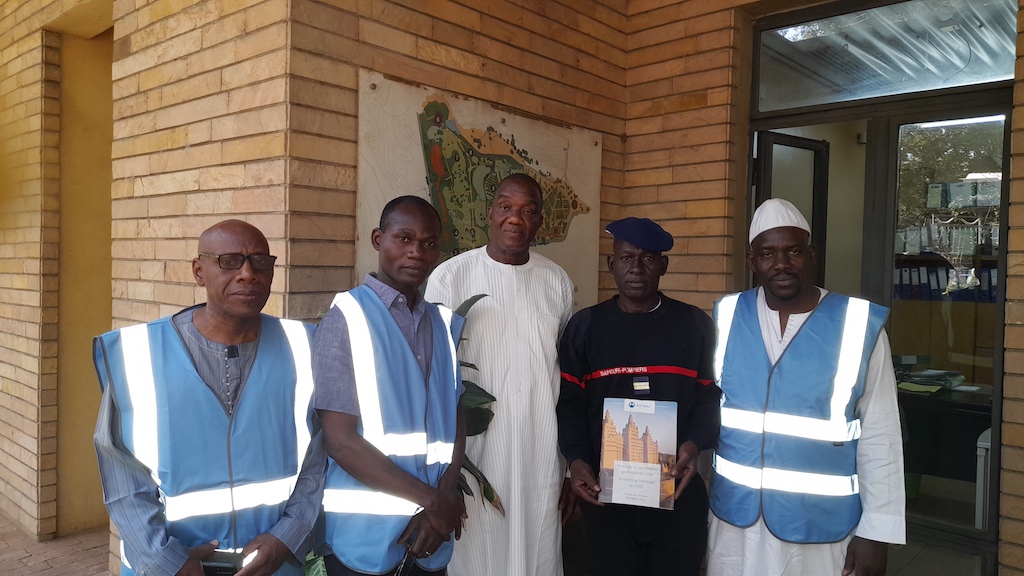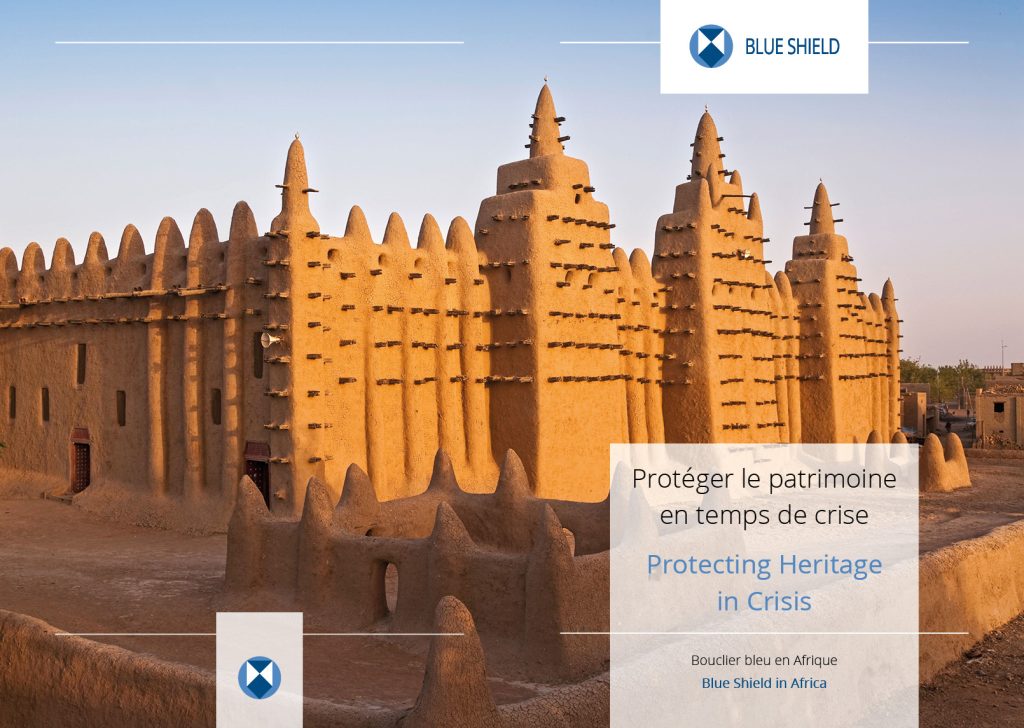As Blue Shield Mali's second anniversary approaches, we look back over the challenges and successes that have followed the National Committee over the past two years.
Accredited by the Blue Shield International’s Secretariat (BSI) on the 18th February 2021, Mali Blue Shield has already achieved a great deal despite the need for vigilance in places where cultural property is located in areas affected by conflict, and the COVID pandemic which disrupted the National Committee’s plans for its meetings, workshops, and on-site activities during 2021-22. It could have been a discouraging start, but the members of the Committee kept in contact through WhatsApp and e-mail with interlocutors and partners including National Committees in neighbouring countries, and with Blue Shield Germany and France. Each member of the Blue Shield family offered encouragement, advice and practical support, as did BSI.
One of the tangible outcomes of this interaction was the publication of a brochure Protecting Heritage in Crisis highlighting the challenges and achievements of the Senegal, Mali and Cameroon National Committees and two Committees then in formation, Mozambique and Niger. The project was led by Blue Shield Germany who organised the brochure’s publication in English and French with funding from the German Federal Foreign office.
Blue Shield Mali's Committee, a wealth of expertise
Blue Shield Mali’s leadership is composed of heritage experts with extensive professional experience in the legal and practical aspects of cultural property protection (CPP). As well as his role as President of the National Committee, Mamadou Samaké is Vice-President of ICOM-Mali and head of the Cultural Mission of Gao, in charge of the administration of the nearby Tomb of Askia. Representatives from ICOMOS-Mali, the National Library, National Museum, Directorate of Archives, and the Directorate for Cultural Heritage are all Blue Shield Mali committee members, as are representatives from the Mali Institute of Social Sciences, Interpol, and the Army Museum in Bamako.
Despite its impressive line up of personnel, and wealth of heritage expertise, Blue Shield Mali’s president is careful not to be too ambitious, at least for now.

"It's only two years since we began setting up our Committee. It's important to go step by step so that we can be sure to be effective in whatever we do."
Mamadou Samaké recalls Tweet
A Glimpse Into Mali's Past

Renowned as an historic seat of Islamic culture and learning, with universities and Koranic schools dating back centuries, Mali was also at the centre of the trade routes that criss-crossed West African Sahel with salt and gold, cattle, books and grain in ancient times. This provided the wealth needed to build mosques and madrassas, libraries and universities in Timbuktu and elsewhere, as well as the 15th Century Tomb of Askia and the even older Kankou-Moussa mosque complex in Gao. Such buildings provide unique insights into the culture and lifestyles of the vast Malian empire that reached its zenith in the 14th Century under Mansa Musa I (1312-1337). The baked-mud building techniques used at that time survive until this day, passed down by skilled artisans from generation to generation.
Mali is home to four UNESCO World Heritage sites — the Land of the Dogons, and three that are on the World Heritage in Danger list (the ancient towns of Djenné, Timbuktu, and the Tomb of Askia). There are also 15 sites on the Tentative list, including the archaeological site and Kankou-Moussa mosque in Gao inscribed in 2021, all under consideration for future World Heritage status.
Blue Shield Mali's Operations
Mali is a State Party to the 1954 Hague Convention for the Protection of Cultural Property in the Event of Armed Conflict, and its 1954 and 1999 Protocols. One of the National Committee’s key priorities to date is to develop awareness and training with the Malian Armed Forces about their obligations to protect and safeguard the country’s cultural heritage as part of International Humanitarian Law. The Armed Forces are focused more on human security according to M. Samaké than on the role CPP can play in helping to build cohesive, peaceful communities, and the Protecting Heritage in Crisis brochure has been a useful advocacy tool.
"Interlocutors appreciate it a lot, and we are grateful for that concrete support from our colleagues in Germany,
remarks Blue Shield Mali's President. Tweet
Looking Ahead
Plans for the coming months include a conference on CPP at Bamako’s University of Social Sciences, and CPP projects in Gao with local communities. On site, the National Committee will work with all concerned parties, including local masons who have traditional building skills.

"People there feel very attached to their heritage. We want the whole community to be involved. But once again, we need to go carefully and not be too ambitious straight away. We want what we do to be effective, and this means being patient and careful".
explains M. Samaké. Tweet
It is not only the safeguarding of monuments that Blue Shield Mali has its sights on over the long term, and there are plans to engage with young people and school children to help build their interest and curiosity about their past. “We are hoping to work with a group of young cineastes,” M. Samaké confides, “and encourage them to make documentaries about the cultural heritage of Mali, especially in Gao”.
Meanwhile, efforts to strengthen cultural heritage ties with neighbouring countries continues. “I’ve just returned from a training in Ouagadougou on ‘Reinforcing the security of museums in the Sahel region and the fight against the illegal trafficking of cultural property: The case with 22 museums in Mali and Burkina Faso’ says M. Samaké. “It was organised by ICOM in collaboration with members of their national committees in Mali and Burkina Faso, and financed by ALIPH. Following this training I had a fruitful exchange with the President of ICOMOS Burkina Faso and ICOM committee members about the possible creation of a Burkina Faso Blue Shield National Committee. I gave them the relevant documentation and some copies of our brochure Protecting Culture in Crisis whilst I was there.”

Read the news story about the founding of the Malian National Committee of the Blue Shield in 2020
Contact them at blueshield.mali @ theblueshield.org
Read their last Annual Report in our Document Library
Learn more about Mali’s amazing World Heritage sites on UNESCO’s website
Learn more about the 1954 Hague Convention for the protection of cultural Property in the Event of Armed Conflict in our Law Library


